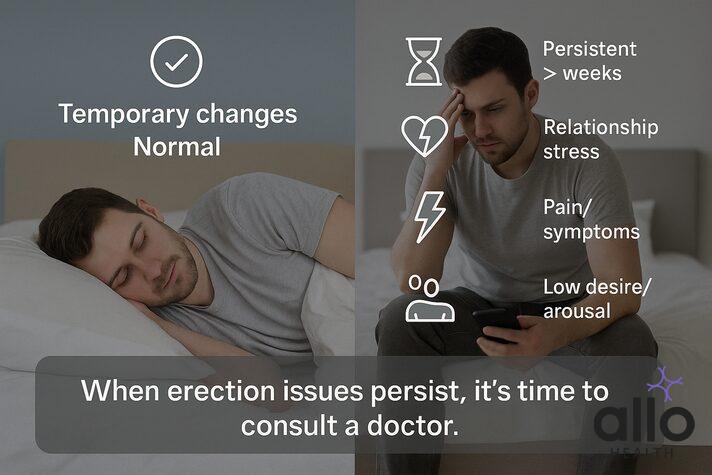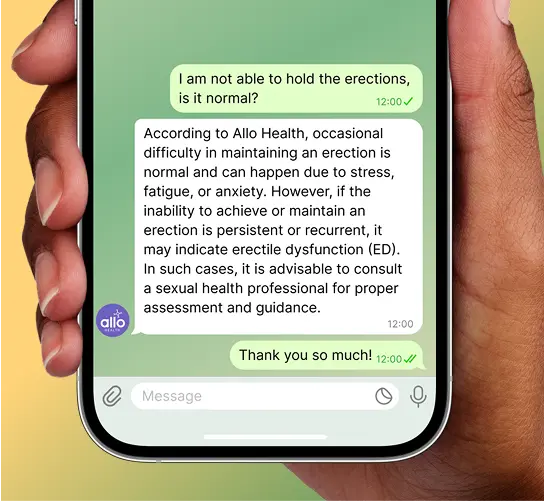Excessive Sex and Erectile Dysfunction: Can Too Much Sex Cause ED?

No, too much sex does not cause erectile dysfunction. Regular sexual activity protects against ED by maintaining healthy blood flow and tissue function. Research shows men who have sex less than once weekly are twice as likely to develop ED compared to those who are sexually active at least weekly. While you might experience temporary fatigue or weaker erections after multiple rounds of sex, this is just your body needing rest and recovery time, not permanent dysfunction. The real causes of ED are health conditions like diabetes or heart disease, lifestyle factors like smoking, and psychological stress, so focus on overall health rather than worrying about sexual frequency.
Can too much sex cause erectile dysfunction? The short answer is no, having frequent sex doesn’t damage erections or “wear out” sexual organs. Research shows that a healthy, active sex life can support penis health and lower the risk of ED over time.
Still, it’s common for men to feel weaker erections after multiple rounds of sex, leading to confusion or worry.
In this article, we’ll clear up the myths, explain how erections work, discuss why they may sometimes feel weaker after lots of sex, and highlight the real causes of ED.
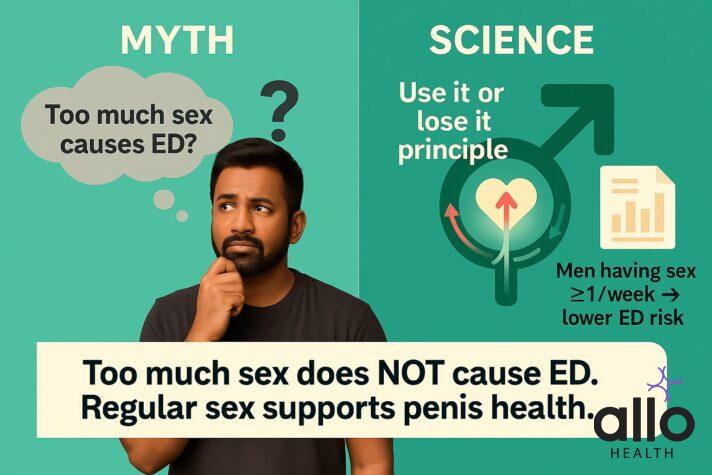
Can Too Much Sex Cause Erectile Dysfunction?
The short answer is no. Having a lot of sex does not damage erections or cause erectile dysfunction (ED). Research[1] shows that a healthy, active, and regular sex life can actually protect sexual health.
A large study called the Tampere Aging Male Urologic Study[2] found that men who had sex less than once a week were twice as likely to develop moderate to complete erectile dysfunction. Men who had sex at least once a week had a lower risk.
Doctors often refer to this as the “use it or lose it” principle. Regular erections help keep the penis tissues and blood vessels strong, just like physical exercise keeps your muscles healthy.
Erection problems are more likely linked to problems in blood circulation, hormones, or stress, and not the frequency of sex.
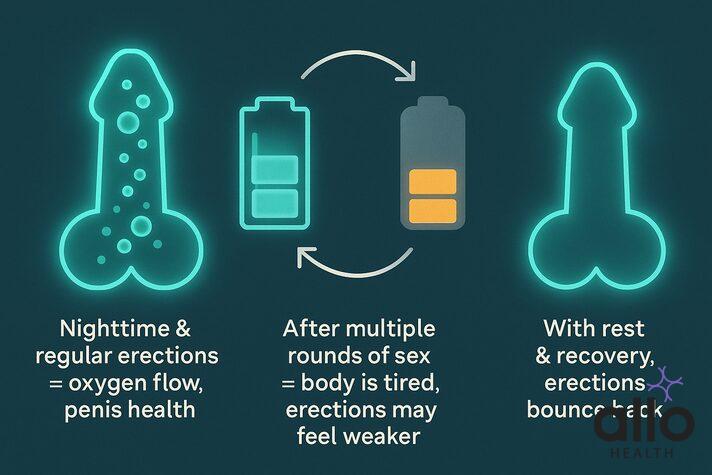
Why Erections Are Good for Penis Health
Most healthy men naturally get about 3-5 erections during sleep every night. These erections aren’t random; they bring oxygen-rich blood to the penis, which keeps the nerves, blood vessels, and smooth muscle flexible and functioning well.[3]
If erections don’t happen for long periods, the penis can miss out on this oxygen supply. Over time, this may reduce flexibility in the erectile tissue, making erections less firm.
There’s a common fear that regular sex or masturbation can “wear out” erections or weaken sexual organs. The truth is, science doesn’t back this up.
What people often mistake for ED is something else entirely, like sexual fatigue[3] (when the body is simply tired) or performance anxiety (worrying about how well you’ll perform). These can make erections harder temporarily, but they are not permanent problems.
Why Erections May Feel Weaker After Lots of Sex
If you’ve had multiple rounds of sex in a short period, you may notice:
- Trouble keeping an erection because your body is tired
- Less pleasure or sensitivity if there isn’t enough recovery time
- Stress or pressure about satisfying your partner
These situations are normal, short-term, and reversible and don’t indicate erectile dysfunction.
Understanding Normal Recovery Time
Recovery time, also called the refractory period, is normal. It changes based on a man’s age and other personal factors. In your teens and twenties, you might be ready to go again in minutes.
In your thirties and forties, it might take 30 minutes to a few hours. By your fifties and beyond, it could take several hours or even a day, and all of this is perfectly normal.
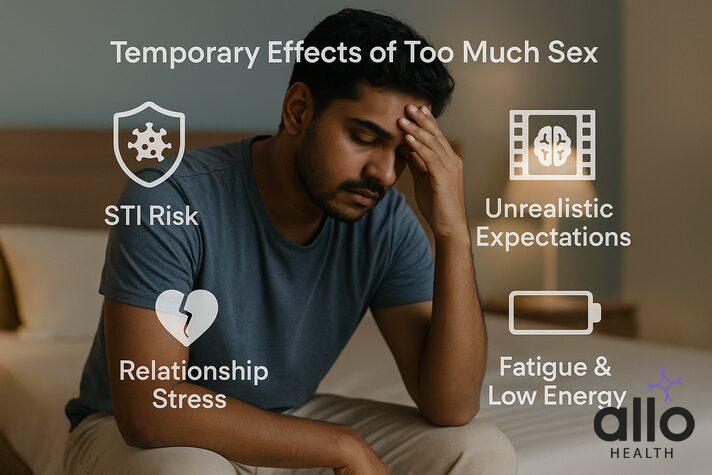
When Too Much Sex Might Affect Erections (Temporarily)
Excessive sex itself doesn’t cause erectile dysfunction. Some related factors can temporarily affect erections or overall sexual health.
Multiple Partners and STI Risk
- Having many partners without protection raises the risk of sexually transmitted infections (STIs).
- Some STIs can affect sexual activity and lead to erection issues if untreated.
Unrealistic Expectations
- Frequent internet porn use can create unrealistic standards for performance.
- This often leads to performance anxiety rather than a physical problem.
Relationship Stress
- Pressure or dissatisfaction in a relationship may trigger stress and anxiety.
- These emotional factors can interfere with arousal and erection quality.
Physical & Lifestyle Factors (Temporary, Not Permanent)
- Fatigue or over-exertion after multiple rounds of sex
- Genital soreness or irritation from inadequate recovery time
- Low energy or lack of sleep reduces overall stamina
- Decreased sensitivity from repeated stimulation
- Stress from “performing too often”
These effects are short-term and reversible. These problems show the body needs rest and recovery. They do not mean permanent erectile dysfunction.
What Really Causes Erectile Dysfunction
ED can have many reasons and risk factors, but too much sex isn’t one of them. Let’s understand what can cause ED:
1. Physical conditions:
- Heart disease(eg. clogged arteries)
- Diabetes
- High blood pressure and high cholesterol
- Hormonal problems (low testosterone)
- Nervous system problems(eg. neurological injuries)
- Certain oral medications(eg, blood pressure drugs)
2. Psychological Conditions:
- Performance anxiety
- Depression and stress
- Relationship factors
- Body image concerns
3. Lifestyle choices:
Real causes of ED are usually linked to circulation, hormones, or stress, not how often you have sex. If your erections return after rest, that’s a clear sign it’s not true ED.
When Should You Be Concerned About ED
Temporary changes in erectile function after frequent sexual activity are normal. They usually go away within a few days to a week with enough rest. But, you should consider talking to a healthcare provider if:
- Erection problems persist for more than a few weeks
- You’re unable to achieve erections even with adequate rest
- You notice changes in your sexual desire and sexual arousal
- You’re experiencing pain or other symptoms
- The issue is causing significant stress in your relationship
According to Allo Health, more than 70% of erectile dysfunction cases we see are linked to circulation problems, lifestyle factors, or stress, not the frequency of sex. This is based on our internal clinical data of over 2.5 lakh patients treated at our clinics.
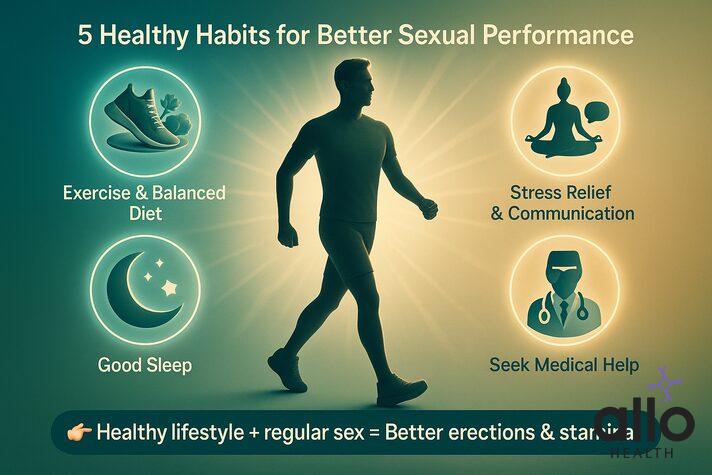
5 Healthy Habits for Better Sexual Performance
1. Keep Your Heart Healthy
Exercise regularly and follow a balanced diet. What’s good for your heart is good for your erections, since both rely on healthy blood flow. Even 30 minutes of walking most days can make a significant difference.
2. Manage Stress and Communicate Openly
Chronic stress is one of the biggest enemies of sexual function. Find healthy ways to manage stress through stress-relief techniques, whether through exercise, meditation, or talking with friends. Keep communication open with your partner about desires, concerns, and expectations.
3. Avoid Smoking and Limit Alcohol
Smoking damages the blood vessels you need for healthy erections, while excessive alcohol can interfere with sexual function both short-term and long-term.
4. Prioritize Quality Sleep
Good sleep is essential for hormone production, energy levels, and overall sexual health. Aim for 7-9 hours of quality sleep each night.
5. Seek Help When Needed
If you notice persistent changes in erectile function, don’t wait to address them. Early intervention often leads to better outcomes, and many effective treatments are available.
Bottom Line
So, can too much sex cause ED? No, too much sex cannot cause ED, but bad lifestyle, stress, and poor health can. Regular sex is instead protective against ED and has health benefits. If you are experiencing ED, talk to a doctor to identify what is causing it and work towards it.
"The following blog article provides general information and insights on various topics. However, it is important to note that the information presented is not intended as professional advice in any specific field or area. The content of this blog is for general educational and informational purposes only.
Book consultation
The content should not be interpreted as endorsement, recommendation, or guarantee of any product, service, or information mentioned. Readers are solely responsible for the decisions and actions they take based on the information provided in this blog. It is essential to exercise individual judgment, critical thinking, and personal responsibility when applying or implementing any information or suggestions discussed in the blog."



